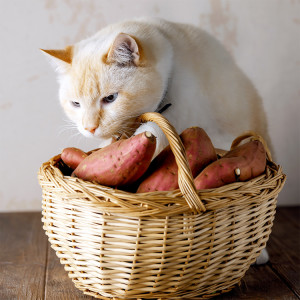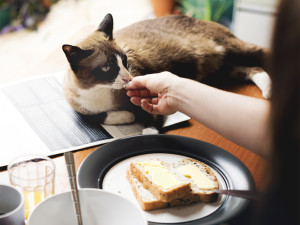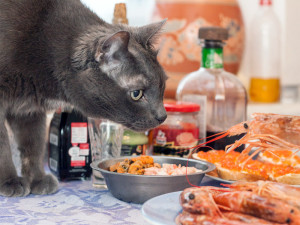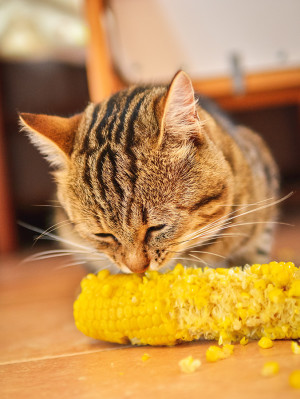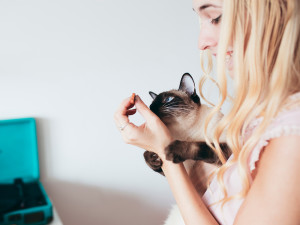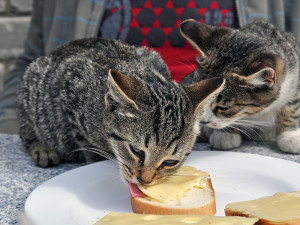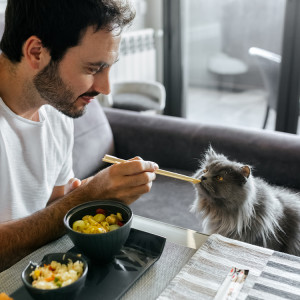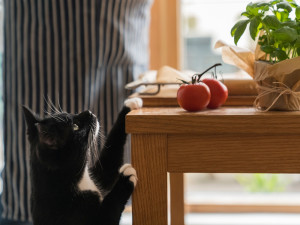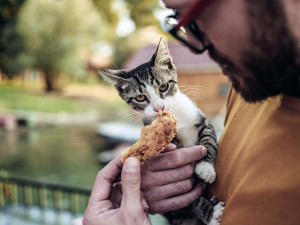Can Cats Eat Pork?
They want in on those barbecue bites...

share article
Yes, pork can be a safe and healthy food for cats, as long as you keep a few important considerations in mind. Pork is not part of a typical diet for cats, mostly due to the fact that a small cat could never take down a wild pig, no matter how fierce they think they are.
And while it’s a far cry from mouse meat, pork still contains many important nutrients that cats need. If you are considering sharing any pork products with your cat, be sure to read on to learn more.
Nutrition facts about pork for cats
Pork is a general term for many different products that come from pigs. Most of us are likely familiar with many of these including cured pork products like bacon, prosciutto, ham, and chorizo. There are also many other cuts of pork that are popular around the world including pork loin, pork shoulder, pork chops, pork ribs, and pretty much any other part of the pig you can think of.
The nutritional profile of these foods varies greatly depending on the specific cut of meat as well as how it is prepared, whether it is cured in some way, and what other ingredients are incorporated. In general, pork is a high protein, high fat food that also contains many important vitamins and minerals.
Is pork good for cats?
Pork can be good for cats depending on the kind of pork, how it's prepared, what other ingredients it contains. Many commercial cat foods use pork in their recipes since it is a good source of certain nutrients. However, pork alone will not provide all of the nutrients that cats need so it must be part of a complete and balanced cat food diet.
Additionally, many kinds of pork that are intended for humans are not safe for cats if they contain added ingredients. As always, it is important to scrutinize each food before sharing it. Some benefits of pork include:
Protein: As obligate carnivores, cats have a high demand for animal-derived proteinopens in a new tab. Protein provides an important source of energy to cats. It is also a source of crucial amino acids used as building blocks for many different biological functions.
Fat: Depending on the cut of pork, the fat content will vary. There are some lean sources of pork while others are very high in fat. Cats utilize fat as a source of energy and to support healthy skin and fur. It is also important for creating a layer of cushion that serves as insulation and protection.Vitamins and minerals: Pork is a good source of B vitamins, potassium, and zinc. These are critical nutrients for cats that play many important roles in the body including supporting healthy growth and development, promoting brain and immune health, maintaining blood pressure, and facilitating vital reactions throughout the body.
Can cats eat raw pork?
Cats should not eat raw or undercooked pork. Any undercooked meat products carry risks of pathogens and pork is no different. Some pork products may also carry a risk of parasites including toxoplasmosisopens in a new tab and trichomonosis. Commercially raised pork in the United States is usually free of these parasites due to deworming practices on large scale farms.
However, pigs that are raised on small-scale farms, with free range access, as well as those raised in other countries may be more at risk for carrying these parasites. The safest option is to cook pork to an internal temperature of 160 degrees Fahrenheit to ensure pathogens are killed.
Is pork completely safe for cats?
Pork is not always safe for cats depending on how it is prepared, and served. Here are some important considerations to keep in mind:
Avoid cured meats: Pork products that have been cured often contain very high levels of salt and fat. Too much salt can cause health problems including high blood pressure, strain on the heart, digestive upsetopens in a new tab, and even swelling of the brain in extreme cases. High-fat foods can also cause digestive upset and contribute to weight gain if they are shared too often. Many cured meats also have other preservatives that are potentially unhealthy for cats, such as nitrates, which have been associated with certain cancersopens in a new tab when consumed frequently. These products should be avoided.
Beware of added ingredients: While pork itself is safe for cats, if it is cooked with ingredients that are unsafe or even toxic to cats, it is no longer OK to share. This includes garlicopens in a new tab, onions, and ingredients that are high in salt, dairy, fat, and/or sugar. The best option is to select lean pieces of plain meat that have no seasoning or added oils and set that aside for your cat, or prepare a plain, separate portion for them.
Choking and digestive hazards: If you do intend to share some plain, unseasoned pieces of pork with your cat, be sure to offer them in bite-sized pieces that your cat can easily chew and swallow. Avoid large chunks of tough meat, anything containing bones or skin, and any inedible accouterments like skewers, toothpicks, or cooking twine. These items can be choking hazardsopens in a new tab and/or put cats at risk for life-threatening intestinal blockages.opens in a new tab
The bottom line: Can cats eat human food?
Cats can eat human foodsopens in a new tab and there are many options that are safe and healthy to share with your favorite kitty. At the same time, it is crucial that cats eat a complete and balanced cat food diet as the bulk of their meals. This is because cats are obligate carnivores, unlike us, omnivores. They have different nutritional needs than we do and can get seriously ill from certain nutritional deficiencies.
So long as 90 percent of their diet comes from a balanced cat food, they can indulge in the occasional treats and table foods. Keep in mind that cats also have sensitivities to certain foods that may be harmless to us, such as foods with lots of dairy, salt, or high-fat ingredients. There are also some foods that are toxic to catsopens in a new tab, like onions, garlic, grapes, and chocolate. Therefore, when selecting foods to share with your cat, be sure to double check that all the ingredients are safe for catsopens in a new tab. If in doubt, contact your vet or a pet poison hotline to confirm that the food is safe to share.
Other foods that are safe for cats
Shrimp is a high-protein snackopens in a new tab for snacks.
Blueberries and other fruits that are lower in sugaropens in a new tab can also be an occasional treat.
Carrots are another good optionopens in a new tab for a crunchy snack.
Other foods that are dangerous
Chocolate contains toxic compounds opens in a new tabthat can make cats very sick.
Butter and other high-fat dairy productsopens in a new tab should also be avoided.
Grapes and raisinsopens in a new tab are also toxic to cats and should be kept out of reach.
FAQs (People also ask):
How much pork can a cat eat?
Plain, unseasoned cooked pork can be an occasional snack for cats; no more than ten percent of their total diet.
Is it OK to give cats pork?
Plain, unseasoned, cooked pork is OK for cats.
Why do cats like pork?
Cats prefer foods that are high in fat and protein, and pork has both.
Can cats eat pork?
Yes, plain, cooked, unseasoned pork is safe for cats in moderation.
Can cats eat bacon?
Bacon and other cured pork products tend to be too high in salt and fat to be safe for cats to consume.
References:

Dr. Amy Fox, DVM
Amy Fox, DVM is a small animal veterinarian in New York City. A lifelong animal lover, Dr. Fox studied biology in college and then worked as a veterinary nurse before pursuing veterinary school at Cornell University. She has worked in many different settings including shelter medicine, emergency medicine, general practice, and animal cruelty and forensics. She is especially interested in nutrition, preventative medicine and care for senior pets. Dr. Fox also enjoys writing about veterinary medicine and teaching. In her free time she loves to cook, garden, and go for long runs.
Related articles
![Two grey cats eating swiss cheese off of slices of bread while sitting on a table]() opens in a new tab
opens in a new tabYou Should Not Invite Your Cat to Your Fancy Cheese Party
Save the charcuterie for the humans.
![Man feeding rice to cat with chopsticks at dinner table]() opens in a new tab
opens in a new tabCan Cats Eat Rice?
A warm bowl of rice is your cat’s version of comfort food.
![A kitten sniffing a ripe half of an avocado in a bowl]() opens in a new tab
opens in a new tabCan Your Cat Be an Avocado Aficionado?
Just don’t get out the guacamole bowl.
![Cat eating out of metal bowl]() opens in a new tab
opens in a new tabTop 10 Foods That Are Toxic to Cats
Sharing isn’t always caring. Keep your cat safe by keeping these human snack staples to yourself.
![Domestic Black Cat Begging for Tomatoes.]() opens in a new tab
opens in a new tabCan Cats Eat Tomatoes?
A little tomato’s safe — with some important caveats.
![Man feeding small white and gray cat a chicken wing.]() opens in a new tab
opens in a new tabCan Cats Eat Raw Chicken?
Careful — cooked chicken is way safer for your kitty.
